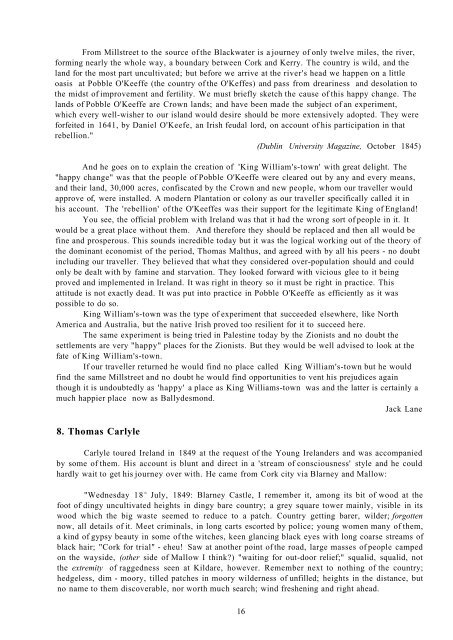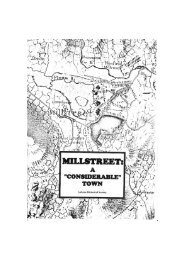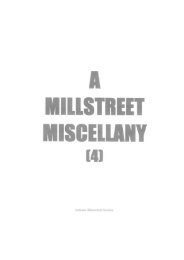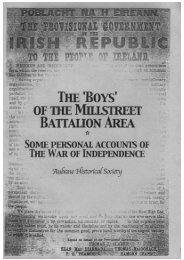A Millstreet Miscellany (3) - Aubane Historical Society
A Millstreet Miscellany (3) - Aubane Historical Society
A Millstreet Miscellany (3) - Aubane Historical Society
You also want an ePaper? Increase the reach of your titles
YUMPU automatically turns print PDFs into web optimized ePapers that Google loves.
From <strong>Millstreet</strong> to the source of the Blackwater is a journey of only twelve miles, the river,<br />
forming nearly the whole way, a boundary between Cork and Kerry. The country is wild, and the<br />
land for the most part uncultivated; but before we arrive at the river's head we happen on a little<br />
oasis at Pobble O'Keeffe (the country of the O'Keffes) and pass from dreariness and desolation to<br />
the midst of improvement and fertility. We must briefly sketch the cause of this happy change. The<br />
lands of Pobble O'Keeffe are Crown lands; and have been made the subject of an experiment,<br />
which every well-wisher to our island would desire should be more extensively adopted. They were<br />
forfeited in 1641, by Daniel O'Keefe, an Irish feudal lord, on account of his participation in that<br />
rebellion."<br />
(Dublin University Magazine, October 1845)<br />
And he goes on to explain the creation of 'King William's-town' with great delight. The<br />
"happy change" was that the people of Pobble O'Keeffe were cleared out by any and every means,<br />
and their land, 30,000 acres, confiscated by the Crown and new people, whom our traveller would<br />
approve of, were installed. A modern Plantation or colony as our traveller specifically called it in<br />
his account. The 'rebellion' of the O'Keeffes was their support for the legitimate King of England!<br />
You see, the official problem with Ireland was that it had the wrong sort of people in it. It<br />
would be a great place without them. And therefore they should be replaced and then all would be<br />
fine and prosperous. This sounds incredible today but it was the logical working out of the theory of<br />
the dominant economist of the period, Thomas Malthus, and agreed with by all his peers - no doubt<br />
including our traveller. They believed that what they considered over-population should and could<br />
only be dealt with by famine and starvation. They looked forward with vicious glee to it being<br />
proved and implemented in Ireland. It was right in theory so it must be right in practice. This<br />
attitude is not exactly dead. It was put into practice in Pobble O'Keeffe as efficiently as it was<br />
possible to do so.<br />
King William's-town was the type of experiment that succeeded elsewhere, like North<br />
America and Australia, but the native Irish proved too resilient for it to succeed here.<br />
The same experiment is being tried in Palestine today by the Zionists and no doubt the<br />
settlements are very "happy" places for the Zionists. But they would be well advised to look at the<br />
fate of King William's-town.<br />
If our traveller returned he would find no place called King William's-town but he would<br />
find the same <strong>Millstreet</strong> and no doubt he would find opportunities to vent his prejudices again<br />
though it is undoubtedly as 'happy' a place as King Williams-town was and the latter is certainly a<br />
much happier place now as Ballydesmond.<br />
Jack Lane<br />
8. Thomas Carlyle<br />
Carlyle toured Ireland in 1849 at the request of the Young Irelanders and was accompanied<br />
by some of them. His account is blunt and direct in a 'stream of consciousness' style and he could<br />
hardly wait to get his journey over with. He came from Cork city via Blarney and Mallow:<br />
"Wednesday 18 th<br />
July, 1849: Blarney Castle, I remember it, among its bit of wood at the<br />
foot of dingy uncultivated heights in dingy bare country; a grey square tower mainly, visible in its<br />
wood which the big waste seemed to reduce to a patch. Country getting barer, wilder; forgotten<br />
now, all details of it. Meet criminals, in long carts escorted by police; young women many of them,<br />
a kind of gypsy beauty in some of the witches, keen glancing black eyes with long coarse streams of<br />
black hair; "Cork for trial" - eheu! Saw at another point of the road, large masses of people camped<br />
on the wayside, (other side of Mallow I think?) "waiting for out-door relief;" squalid, squalid, not<br />
the extremity of raggedness seen at Kildare, however. Remember next to nothing of the country;<br />
hedgeless, dim - moory, tilled patches in moory wilderness of unfilled; heights in the distance, but<br />
no name to them discoverable, nor worth much search; wind freshening and right ahead.<br />
16





